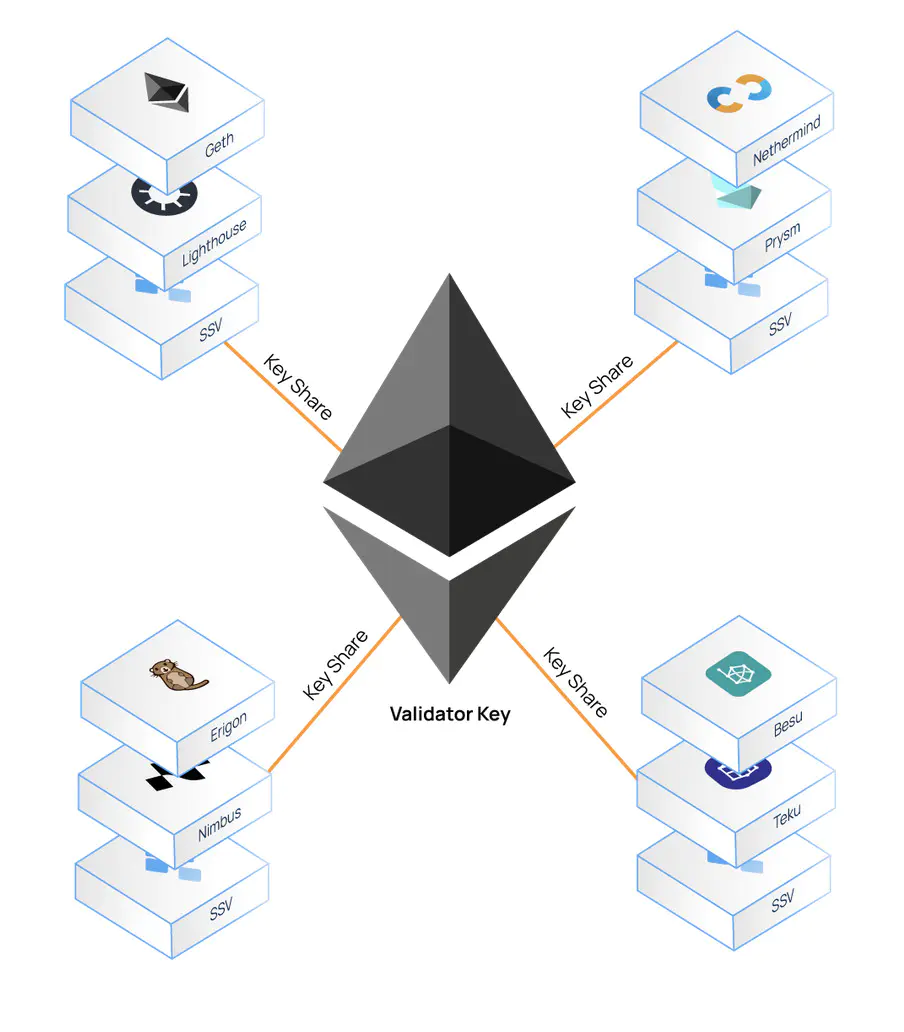In this article, we'll explore SSV Network, a decentralized solution created to address key challenges within Ethereum's staking landscape. By leveraging Distributed Validator Technology (DVT), the SSV Network brings a new layer of resilience and adaptability to the PoS ecosystem, shedding light on its potential to shape future Ethereum staking practices.
The Current Landscape of Ethereum Staking
The Ethereum ecosystem is advancing rapidly, but as with any large-scale, decentralized infrastructure, it comes with its challenges:
- Centralization Concerns: While Ethereum promotes decentralization, the current staking user experience inadvertently led to centralization tendencies, with a limited number of Node Operators and smart contract liquid staking solutions having disproportionate influence.
- Operational Vulnerabilities: Relying solely on a single Node Operator presents evident risks regarding potential downtime or breaches, which can jeopardize staking rewards, create slashing risks, and destabilize the network.
SSV Network: Addressing the Core Challenges
The SSV network represents a step forward in the Ethereum staking ecosystem. It is a decentralized, open-source, and trustless network, built to facilitate seamless Ethereum validator operations. At its core, it distributes the operations of a single validator across multiple non-trusting nodes, or operators, fostering a network that is resilient to centralization, redundancy, and security issues that affect the Ethereum PoS consensus.
Ethereum's New Staking Landscape
With the introduction of PoS, Ethereum staking has become a focal point in the cryptocurrency domain. Validators, replacing miners, lock up a substantial amount of Ethereum (32 ETH) in a smart contract to participate in network operations. This transition introduced a range of complexities, making the process less accessible for many potential participants.
Challenges and Solutions in Validator Key Management
The validator creation process generates two distinct key pairs: a Validator key and a Withdrawal key. These keys, especially the Validator key, need to remain online almost continually to facilitate network operations. This continuous online requirement presents a unique set of challenges in maintaining connectivity and ensuring security. The SSV network steps in here, preventing downtime and security breaches by distributing the validator operations across multiple nodes.

Decentralizing Ethereum Validator Operations
Originating from a collaborative effort with members of the Ethereum Foundation, SSV lays the foundation for the future of staking. Through its dual-layer design consisting of the SSV Peer-to-Peer (P2P) network layer and the Ethereum contract layer, it ensures decentralized operation, transparency, and robust network governance, leading to a future where Ethereum staking is more inclusive, secure, and efficient.
Goals and Advantages of the SSV Network
- Enhanced Decentralization: To redefine the architecture of Ethereum validation, ensuring that it's not only trustless but also fully decentralized.
- Strong Infrastructure: The goal is to provide a resilient and fault-tolerant infrastructure solution, positioning Ethereum staking for maximum uptime and performance.
- Broad Accessibility: Make staking on Ethereum more accessible to users regardless of their technical expertise, democratizing participation in the network.
For stakeholders, the SSV Network presents distinct benefits. By decentralizing validator operations, institutions are less vulnerable to localized infrastructure failures or potential breaches. The network's design inherently minimizes risks while ensuring consistent validator performance, allowing institutions to have greater confidence in the staking process. This holistic approach offers both security and operational advantages, making SSV an attractive proposition for all stakeholders.
Unique Selling Points (USP)
- Distributed Validator Technology (DVT): SSV is leveraging DVT which represents a shift from traditional Ethereum validation. It focuses on decentralizing validator operations, reducing single points of vulnerability.
- Two-tiered Framework: SSV has integrated both a P2P network layer and the Ethereum contract layer, effectively streamlining validator execution while simultaneously anchoring governance mechanisms.
- Adaptability Quotient: The rapidly evolving landscape of Ethereum requires systems that can pivot accordingly. SSV Network is designed to accommodate and align with protocol shifts, ensuring its relevance in a fluctuating ecosystem.
The first layer, the Peer-to-Peer (P2P) network, is primarily concerned with validator execution. It ensures a seamless interaction among validators and optimizes operations in real-time. The second layer, the Ethereum contract layer, is pivotal for governance. This not only strengthens the transparency and accountability of the system but also provides a foundational layer that can be adapted and updated as Ethereum evolves. By segregating these layers, SSV ensures specialized efficiency in both validation operations and network governance.
- Transparent Evaluation: On the SSV Network, operators are regularly assessed and ranked through a transparent process. Every operator’s contribution is measured, recognized, and accounted for.
- Community-driven Decisions: Governance decisions, from protocol upgrades to assessment criteria, are based on community consensus, ensuring that SSV remains a network truly for the users, by the users.
Final Thoughts
The Ethereum staking landscape is rapidly evolving, and the SSV Network stands out as a pillar of advancement. Addressing the challenges of centralization and inherent security vulnerabilities in traditional staking, SSV offers solutions that indicate a decentralized future where distributed validator technology takes center stage. We are deeply proud to not only invest in the SSV Network but also look forward to the opportunity to operate as a validator of operating Ethereum nodes via SSV for our partners, as well as liquid staking solutions and other upcoming protocols. Our commitment has been strong since 2021, running testnets and continuously supporting its growth. As part of the DAO and with our proactive contributions through votes and proposals on Snapshot, our involvement goes beyond mere participation. It's a reflection of our belief in the DVT and our confidence in the SSV Network's pivotal role in the PoS ecosystem.


Join the conversation